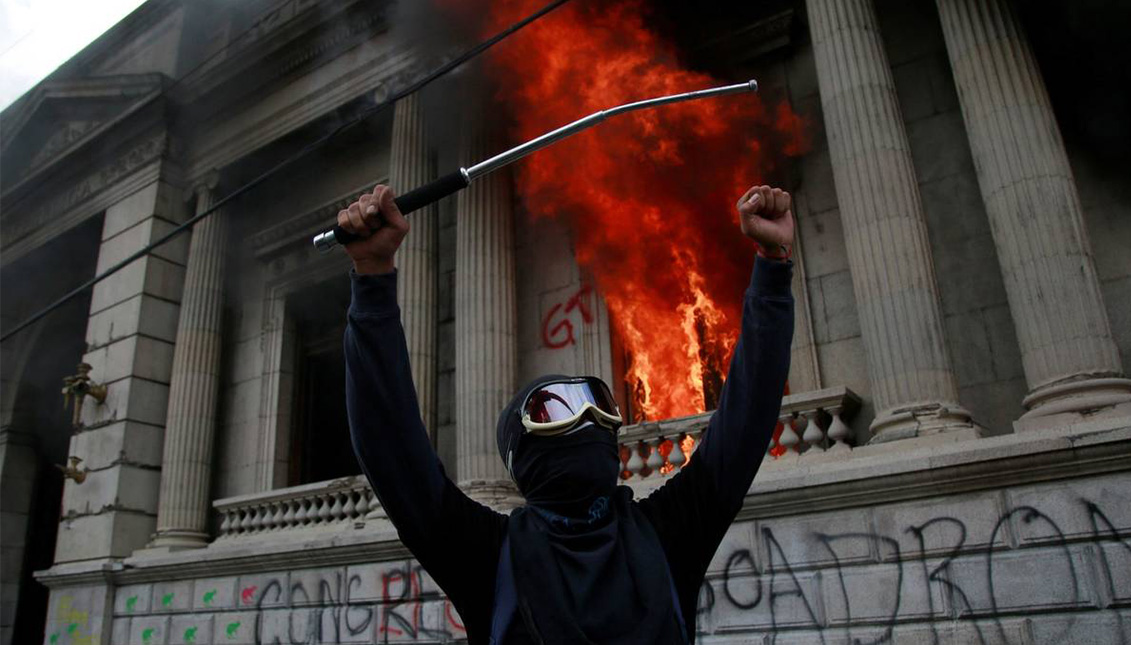
Viral fire in Guatemalan Congress
Demonstrations of various kinds took place on Nov. 21 against the budget cuts announced by the right-wing Giammattei administration.
On Saturday, Nov. 21, 100 demonstrators that came out ahead of the popular protests against the new budget promoted by Guatemalan President Alejandro Giammattei broke the doors and windows of Parliament and set it on fire by throwing torches inside without anyone inside.
The chaos of the assault lasted only 10 minutes, and the fire spread until it was put out by firemen. The hooded assailants continued the damage until they were forcibly evicted by the national police. The agents also used tear gas bombs to disperse the demonstrators, for which several people had to be treated for inhalation problems by the Red Cross.
The images of the fire went viral during the weekend and toured the world through social media, where they were used as a symbol of many feelings of our time: popular revolution, political discredit, indignation, repression, and destabilization in South America.
However, the political reality of the country is much more concrete, such that the great bulk of the demonstrators were peacefully protesting one kilometer away for the same events and against Giammattei in front of the National Palace of Culture.
The powder keg of the protests and the massive call on Saturday was the state budget for 2021, which was approved on Nov. 18 by Guatemalan Congress in the early morning without the deputies having access. The reason for doing so is because the budget has many uncertainties. Although it is the most generous in its history — with an almost $13 million, an increase of more than a million compared to 2020 — the reality is that it focuses on the business and industrial fabric and ignores national dramas such as child malnutrition and poverty that affects almost half of the country's children.
RELATED CONTENT
Moreover, according to Infobae, it seems that some analysts doubt that a state project can work when a third of the budget is financed by debt.
Therefore, as the week advanced and future protests were threatened, Vice President Guillermo Castillo reacted on Friday by asking President Giammattei to resign to "oxygenate" the country. The request seemed complex for the conservative president, who appeared on the political scene in 2017 after serving in several right-wing parties until founding his own, Vamos por una Guatemala Diferente is liberal with the economy, but is deeply conservative on social issues, including attitudes against abortion or homosexual marriage. Some also interpreted Castillo's gesture, who also called for the dismantling of the Center of Government that coordinates its 14 ministries, as a strategy to ascend to power.
But it seems the president did not take any notice and the protests came on Saturday with a more tangible political instability than ever. To the budgets and terrible week should be added poverty, hurricanes, and the unstoppable rise of the COVID-19 — with an infection rate of 702 per 100,000 inhabitants. All this, with a considered tradition of embezzlement, makes Guatemala one of the six most corrupt countries on the continent with one of the highest incidences of child malnutrition.
The protests ended with 42 people arrested, viral images of fire and a guillotine the demonstrators dragged through the streets, and an undetermined number of injured people among whom, according to the Human Rights Ombudsman, include a person who lost his eye and another who had to be operated on with a cerebral hemorrhage.
The week of Nov. 23 begins full of tense expectations for Guatemala. Not only did Giammetti disregard the protest, but on Nov. 22, he invoked the Carta Democrática Interamericana, a mechanism to protect the democracies of Latin American countries, while speaking of "systematic acts of violence against national institutions" that would constitute in his discourse "a true state coup." The world will keep an eye on the conservative president's directives and trust he will avoid the repressive drifts that harass other nations.










LEAVE A COMMENT:
Join the discussion! Leave a comment.